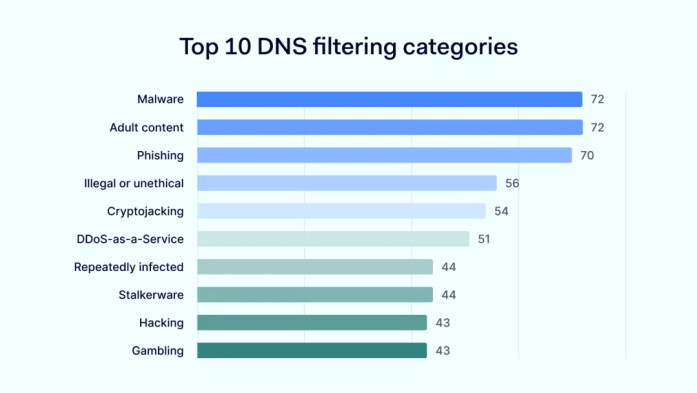
Cybersecurity experts say that blocking certain websites lowers the risk of cyberattacks and removes distractions
NEW YORK, NY / ACCESSWIRE / April 3, 2024 / According to data collected by the cybersecurity company NordLayer, a significant portion of employers (72%) block malicious and adult websites. Malicious websites can pose severe security threats by spreading malware, while adult websites are often restricted due to concerns over inappropriate content and potential productivity loss. Gambling sites are blocked by 43% of employers, likely due to concerns over addiction and productivity loss.

Research shows that the Domain Name System (DNS) filtering feature is also used for blocking phishing, cryptojacking, illegal, and DDoS as a Service (DaaS) websites. This way, employers try to protect their networks and systems from cyber threats and illegal activities.
"In today's threat landscape, where cyberattacks are becoming increasingly sophisticated, DNS filtering plays a pivotal role in safeguarding sensitive data, maintaining regulatory compliance, and preserving the integrity of organizational networks," says Carlos Salas, a cybersecurity expert at NordLayer.
Employers seek to maintain a professional work environment
Besides just blocking adult websites, many managers take a step further to maintain a professional work environment. For example, 30% block dating sites, 28% do not allow access to sex education websites, and about 12% of employers even block lingerie sites.
Information or sales related to drugs websites are blocked by 37% of IT managers. Interestingly, 21% of employers block VPN websites, likely to prevent employees from circumventing network restrictions and accessing blocked content, which could pose security risks or productivity concerns.
"To lower distractions from work and promote productivity, 19% of IT managers restrict access to gaming websites because they can be time-consuming and embedded with ads and hyperlinks to other malicious websites. Additionally, celebrity news websites and social media are blocked by 8% and 7% of employers, respectively," adds Salas.
U.S. employers are less restrictive compared to global data
In the United States, employers tend to adopt a more lenient approach towards restricting employee internet access at work compared to global averages. While malicious websites pose significant security risks, only 62% of U.S. employers block them, which is lower than the global average of 72%.
Similarly, adult websites are restricted by 57% of IT managers in the U.S., which is also lower than the global average. Gambling websites are disabled by 35% of U.S. employers. When it comes to potential distractions, gaming websites are restricted in only 16% of U.S. employers' workplaces.
Additionally, celebrity news websites are blocked by only 7% of U.S. employers, aligning with the global average, while social media is inaccessible in just 5% of U.S. businesses.
Compared to the United States, Canadian businesses are less restrictive on gambling, because only 28% have blocked access to online casinos. Interestingly, while Canadian employers are more strict on adult content (60%), they are less likely to block dating sites (20%, while in the U.S. - 24%), sex education (4%, U.S. - 20%), and lingerie (4%, U.S. - 14%).
Contact Information
Vilius Kardelis
PR manager
vilius@nordsec.com
SOURCE: NordLayer
View the original press release on newswire.com.
